Deck 30: Induction and Inductance
Question
Question
Question
Question
Question
Question
Question
Question
Question
Question
Question
Question
Question
Question
Question
Question
Question
Question
Question
Question
Question
Question
Question
Question
Question
Question
Question
Question
Question
Question
Question
Question
Question
Question
Question
Question
Question
Question
Question
Question
Question
Question
Question
Question
Question
Question
Question
Question
Question
Question
Question
Question
Question
Question
Question
Question
Question
Question
Question
Question
Question
Question
Question
Question
Question
Question
Question
Question
Question
Question
Question
Question
Question
Question
Question
Question
Question
Question
Question
Question

Unlock Deck
Sign up to unlock the cards in this deck!
Unlock Deck
Unlock Deck
1/90
Play
Full screen (f)
Deck 30: Induction and Inductance
1
A uniform magnetic field makes an angle of 30 ° with the z axis.If the magnetic flux through a 1.0 m2 portion of the xy plane is 5.0 Wb then the magnetic flux through a 2.0 m2 portion of the same plane is:
A)2.5 Wb
B)4.3 Wb
C)5.0 Wb
D)5.8 Wb
E)10 Wb
A)2.5 Wb
B)4.3 Wb
C)5.0 Wb
D)5.8 Wb
E)10 Wb
10 Wb
2
A rectangular loop of wire has area A.It is placed perpendicular to a uniform magnetic field B and then spun around one of its sides at frequency f.The maximum induced emf is:
A)BAf/2?
B)BAf
C)2BAf
D)2 BAf
E)4 BAf
A)BAf/2?
B)BAf
C)2BAf
D)2 BAf
E)4 BAf
2 BAf
3
The graph shows the magnitude B of a uniform magnetic field that is perpendicular to the plane of a conducting loop.Rank the four regions indicated on the graph according to the magnitude of the emf induced in the loop, from least to greatest. 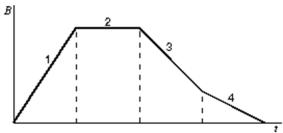
A)1, 2, 3, 4
B)2, 4, 3, 1
C)4, 3, 1, 2
D)1, 3, 4, 2
E)4, 3, 2, 1

A)1, 2, 3, 4
B)2, 4, 3, 1
C)4, 3, 1, 2
D)1, 3, 4, 2
E)4, 3, 2, 1
2, 4, 3, 1
4
The emf developed in a coil X due to the current in a neighboring coil Y is proportional to the:
A)magnetic field in X
B)rate of change of magnetic field in X
C)resistance of X
D)thickness of the wire in X
E)current in Y
A)magnetic field in X
B)rate of change of magnetic field in X
C)resistance of X
D)thickness of the wire in X
E)current in Y

Unlock Deck
Unlock for access to all 90 flashcards in this deck.
Unlock Deck
k this deck
5
The normal to a certain 1.0 m2 area makes an angle of 60° with a uniform magnetic field.The magnetic flux through this area is the same as the flux through a second area that is perpendicular to the field if the second area is:
A)0.50 m2
B)0.87 m2
C)1.0 m2
D)1.2 m2
E)2.0 m2
A)0.50 m2
B)0.87 m2
C)1.0 m2
D)1.2 m2
E)2.0 m2

Unlock Deck
Unlock for access to all 90 flashcards in this deck.
Unlock Deck
k this deck
6
A rod lies across frictionless rails in a uniform magnetic field B, as shown.The rod moves to the right with speed v.In order for the emf around the circuit to be zero, the magnitude of the magnetic field should: 
A)not change
B)increase linearly with time
C)decrease linearly with time
D)increase quadratically with time
E)decrease quadratically with time

A)not change
B)increase linearly with time
C)decrease linearly with time
D)increase quadratically with time
E)decrease quadratically with time

Unlock Deck
Unlock for access to all 90 flashcards in this deck.
Unlock Deck
k this deck
7
1 weber is the same as:
A)1 V.s
B)1 T.s
C)1 T/m
D)1 V/s
E)1 T/m2
A)1 V.s
B)1 T.s
C)1 T/m
D)1 V/s
E)1 T/m2

Unlock Deck
Unlock for access to all 90 flashcards in this deck.
Unlock Deck
k this deck
8
Faraday's law states that an induced emf is proportional to:
A)the rate of change of the magnetic field
B)the rate of change of the electric field
C)the rate of change of the magnetic flux
D)the rate of change of the electric flux
E)zero
A)the rate of change of the magnetic field
B)the rate of change of the electric field
C)the rate of change of the magnetic flux
D)the rate of change of the electric flux
E)zero

Unlock Deck
Unlock for access to all 90 flashcards in this deck.
Unlock Deck
k this deck
9
The units of motional emf are:
A)volt/second
B)volt.meter/second
C)volt/tesla
D)tesla/second
E)tesla.meter2/second
A)volt/second
B)volt.meter/second
C)volt/tesla
D)tesla/second
E)tesla.meter2/second

Unlock Deck
Unlock for access to all 90 flashcards in this deck.
Unlock Deck
k this deck
10
Suppose this page is perpendicular to a uniform magnetic field and the magnetic flux through it is 5.0 Wb.If the page is turned by 30°around an edge the flux through it will be:
A)2.5 Wb
B)4.3 Wb
C)5.0 Wb
D)5.8 Wb
E)10 Wb
A)2.5 Wb
B)4.3 Wb
C)5.0 Wb
D)5.8 Wb
E)10 Wb

Unlock Deck
Unlock for access to all 90 flashcards in this deck.
Unlock Deck
k this deck
11
A changing magnetic field pierces the interior of a circuit containing three identical resistors.Two voltmeters are connected as shown.V1 reads 1 mV across R.V2 reads the voltage across the other two resistors, which is: 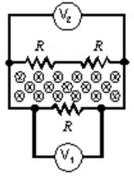
A)0 V
B)1/3 mV
C)1/2 mV
D)1 mV
E)2 mV

A)0 V
B)1/3 mV
C)1/2 mV
D)1 mV
E)2 mV

Unlock Deck
Unlock for access to all 90 flashcards in this deck.
Unlock Deck
k this deck
12
A 2.0 T uniform magnetic field makes an angle of 30 ° with the z axis.The magnetic flux through a 3.0 m2 portion of the xy plane is:
A)2.0 Wb
B)3.0 Wb
C)5.2 Wb
D)6.0 Wb
E)12 Wb
A)2.0 Wb
B)3.0 Wb
C)5.2 Wb
D)6.0 Wb
E)12 Wb

Unlock Deck
Unlock for access to all 90 flashcards in this deck.
Unlock Deck
k this deck
13
The emf that appears in Faraday's law is:
A)around a conducting circuit
B)around the boundary of the surface used to compute the magnetic flux
C)throughout the surface used to compute the magnetic flux
D)perpendicular to the surface used to compute the magnetic flux
E)none of the above
A)around a conducting circuit
B)around the boundary of the surface used to compute the magnetic flux
C)throughout the surface used to compute the magnetic flux
D)perpendicular to the surface used to compute the magnetic flux
E)none of the above

Unlock Deck
Unlock for access to all 90 flashcards in this deck.
Unlock Deck
k this deck
14
The magnetic flux ΦB through a surface:
A)is the amount of magnetic field piercing the surface.
B)is the magnetic field multiplied by the area.
C)does not depend on the area involved.
D)is the line integral of the magnetic field around the edge of the surface.
E)is the amount of magnetic field skimming along the surface.
A)is the amount of magnetic field piercing the surface.
B)is the magnetic field multiplied by the area.
C)does not depend on the area involved.
D)is the line integral of the magnetic field around the edge of the surface.
E)is the amount of magnetic field skimming along the surface.

Unlock Deck
Unlock for access to all 90 flashcards in this deck.
Unlock Deck
k this deck
15
In the circuit shown, there will be a non-zero reading in galvanometer G: 
A)only just after S is closed
B)only just after S is opened
C)only while S is kept closed
D)never
E)only just after S is opened or closed

A)only just after S is closed
B)only just after S is opened
C)only while S is kept closed
D)never
E)only just after S is opened or closed

Unlock Deck
Unlock for access to all 90 flashcards in this deck.
Unlock Deck
k this deck
16
If the magnetic flux through a certain region is changing with time:
A)energy must be dissipated as heat
B)an electric field must not exist at the boundary
C)a current must flow around the boundary
D)an emf must exist around the boundary
E)a magnetic field must exist at the boundary
A)energy must be dissipated as heat
B)an electric field must not exist at the boundary
C)a current must flow around the boundary
D)an emf must exist around the boundary
E)a magnetic field must exist at the boundary

Unlock Deck
Unlock for access to all 90 flashcards in this deck.
Unlock Deck
k this deck
17
Coils P and Q each have a large number of turns of insulated wire.When switch S is closed, the pointer of galvanometer G is deflected toward the left.Now that S is closed, to make the pointer of G deflect toward the right one could: 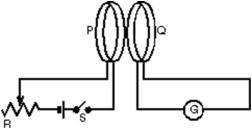
A)move the slide of the rheostat R quickly to the right
B)move coil P toward coil Q
C)move coil Q toward coil P
D)open S
E)do none of the above

A)move the slide of the rheostat R quickly to the right
B)move coil P toward coil Q
C)move coil Q toward coil P
D)open S
E)do none of the above

Unlock Deck
Unlock for access to all 90 flashcards in this deck.
Unlock Deck
k this deck
18
1 weber is the same as:
A)1 V/s
B)1 T/s
C)1 T/m
D)1 T.m2
E)1 T/m2
A)1 V/s
B)1 T/s
C)1 T/m
D)1 T.m2
E)1 T/m2

Unlock Deck
Unlock for access to all 90 flashcards in this deck.
Unlock Deck
k this deck
19
In the experiment shown: 
A)there is a steady reading in G as long as S is closed
B)a motional emf is generated when S is closed
C)the current in the battery goes through G
D)there is a current in G just after S is opened or closed
E)since the two loops are not connected, the current in G is always zero

A)there is a steady reading in G as long as S is closed
B)a motional emf is generated when S is closed
C)the current in the battery goes through G
D)there is a current in G just after S is opened or closed
E)since the two loops are not connected, the current in G is always zero

Unlock Deck
Unlock for access to all 90 flashcards in this deck.
Unlock Deck
k this deck
20
A car travels northward at 75 km/h along a straight road in a region where Earth's magnetic field has a vertical component of 0.50 * 10-4 T.The emf induced between the left and right side, separated by 1.7 m, is:
A)0 V
B)1.8 mV
C)3.6 mV
D)6.4 mV
E)23 mV
A)0 V
B)1.8 mV
C)3.6 mV
D)6.4 mV
E)23 mV

Unlock Deck
Unlock for access to all 90 flashcards in this deck.
Unlock Deck
k this deck
21
A long straight wire is in the plane of a rectangular conducting loop.The straight wire carries an increasing current in the direction shown.The current in the loop is: 
A)zero
B)clockwise
C)counterclockwise
D)clockwise in the left side and counterclockwise in the right side
E)counterclockwise in the left side and clockwise in the right side

A)zero
B)clockwise
C)counterclockwise
D)clockwise in the left side and counterclockwise in the right side
E)counterclockwise in the left side and clockwise in the right side

Unlock Deck
Unlock for access to all 90 flashcards in this deck.
Unlock Deck
k this deck
22
A rectangular loop of wire is placed midway between two long straight parallel conductors as shown.The conductors carry currents i1 and i2 as indicated.If i1 is increasing and i2 is constant, then the induced current in the loop is: 
A)zero
B)clockwise
C)counterclockwise
D)depends on i1 - i2
E)depends on i1 + i2

A)zero
B)clockwise
C)counterclockwise
D)depends on i1 - i2
E)depends on i1 + i2

Unlock Deck
Unlock for access to all 90 flashcards in this deck.
Unlock Deck
k this deck
23
One hundred turns of insulated copper wire are wrapped around an iron core of cross-sectional area 0.100 m2.The circuit is completed by connecting the coil to a 10- resistor.As the magnetic field along the coil axis changes from 1.00 T in one direction to 1.00 T in the other direction, the total charge that flows through the resistor is:
A)0.01 C
B)0.02 C
C)0.2 C
D)1 C
E)2 C
A)0.01 C
B)0.02 C
C)0.2 C
D)1 C
E)2 C

Unlock Deck
Unlock for access to all 90 flashcards in this deck.
Unlock Deck
k this deck
24
A single loop of wire with a radius of 7.5 cm rotates about a diameter in a uniform magnetic field of 1.6 T.To produce a maximum emf of 1.0 V, it should rotate at:
A)0 rad/s
B)2.7 rad/s
C)5.6 rad/s
D)35 rad/s
E)71 rad/s
A)0 rad/s
B)2.7 rad/s
C)5.6 rad/s
D)35 rad/s
E)71 rad/s

Unlock Deck
Unlock for access to all 90 flashcards in this deck.
Unlock Deck
k this deck
25
A long straight wire is in the plane of a rectangular conducting loop.The straight wire carries a constant current i, as shown.While the wire is being moved toward the loop, the current in the loop is: 
A)zero
B)clockwise
C)counterclockwise
D)clockwise in the left side and counterclockwise in the right side
E)counterclockwise in the left side and clockwise in the right side

A)zero
B)clockwise
C)counterclockwise
D)clockwise in the left side and counterclockwise in the right side
E)counterclockwise in the left side and clockwise in the right side

Unlock Deck
Unlock for access to all 90 flashcards in this deck.
Unlock Deck
k this deck
26
The figure shows a bar moving to the right on two conducting rails.To make an induced current i in the direction indicated, a constant magnetic field between the rails should be in what direction? 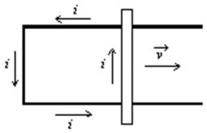
A)Right
B)Left
C)Into the page
D)Out of the page
E)Impossible, cannot be done with a constant magnetic field

A)Right
B)Left
C)Into the page
D)Out of the page
E)Impossible, cannot be done with a constant magnetic field

Unlock Deck
Unlock for access to all 90 flashcards in this deck.
Unlock Deck
k this deck
27
A vertical bar magnet is dropped through the center of a horizontal loop of wire, with its north pole leading.At the instant when the midpoint of the magnet is in the plane of the loop, the induced current in the loop, viewed from above, is:
A)maximum and clockwise
B)maximum and counterclockwise
C)not maximum but clockwise
D)not maximum but counterclockwise
E)essentially zero
A)maximum and clockwise
B)maximum and counterclockwise
C)not maximum but clockwise
D)not maximum but counterclockwise
E)essentially zero

Unlock Deck
Unlock for access to all 90 flashcards in this deck.
Unlock Deck
k this deck
28
You push a permanent magnet with its north pole away from you toward a loop of conducting wire in front of you.Before the north pole enters the loop the current in the loop is:
A)zero
B)clockwise
C)counterclockwise
D)to your left
E)to your right
A)zero
B)clockwise
C)counterclockwise
D)to your left
E)to your right

Unlock Deck
Unlock for access to all 90 flashcards in this deck.
Unlock Deck
k this deck
29
A long straight wire is in the plane of a rectangular conducting loop.The straight wire initially carries a constant current i in the direction shown.While the current i is being shut off, the current in the loop is: 
A)zero
B)clockwise
C)counterclockwise
D)clockwise in the left side and counterclockwise in the right side
E)counterclockwise in the left side and clockwise in the right side

A)zero
B)clockwise
C)counterclockwise
D)clockwise in the left side and counterclockwise in the right side
E)counterclockwise in the left side and clockwise in the right side

Unlock Deck
Unlock for access to all 90 flashcards in this deck.
Unlock Deck
k this deck
30
A rectangular loop of wire is placed perpendicular to a uniform magnetic field and then spun around one of its sides at frequency f.The induced emf is a maximum when:
A)the flux is zero
B)the flux is a maximum
C)the flux is half its maximum value
D)the derivative of the flux with respect to time is zero
E)none of the above
A)the flux is zero
B)the flux is a maximum
C)the flux is half its maximum value
D)the derivative of the flux with respect to time is zero
E)none of the above

Unlock Deck
Unlock for access to all 90 flashcards in this deck.
Unlock Deck
k this deck
31
The four wire loops shown have edge lengths of either L, 2L, or 3L.They will move with the same speed into a region of uniform magnetic field  directed out of the page.Rank them according to the maximum magnitude of the induced emf, least to greatest.
directed out of the page.Rank them according to the maximum magnitude of the induced emf, least to greatest. 
A)1 and 2 tie, then 3 and 4 tie
B)3 and 4 tie, then 1 and 2 tie
C)4, then 2 and 3 tie, then 1
D)1, then 2 and 3 tie, then 4
E)1, 2, 3, 4
 directed out of the page.Rank them according to the maximum magnitude of the induced emf, least to greatest.
directed out of the page.Rank them according to the maximum magnitude of the induced emf, least to greatest. 
A)1 and 2 tie, then 3 and 4 tie
B)3 and 4 tie, then 1 and 2 tie
C)4, then 2 and 3 tie, then 1
D)1, then 2 and 3 tie, then 4
E)1, 2, 3, 4

Unlock Deck
Unlock for access to all 90 flashcards in this deck.
Unlock Deck
k this deck
32
A copper hoop is held in a vertical east-west plane in a uniform magnetic field whose field lines run along the north-south direction.The largest induced emf is produced when the hoop is:
A)rotated about a north-south axis
B)rotated about an east-west axis
C)moved rapidly, without rotation, toward the east
D)moved rapidly, without rotation, toward the south
E)moved rapidly, without rotation, toward the northwest
A)rotated about a north-south axis
B)rotated about an east-west axis
C)moved rapidly, without rotation, toward the east
D)moved rapidly, without rotation, toward the south
E)moved rapidly, without rotation, toward the northwest

Unlock Deck
Unlock for access to all 90 flashcards in this deck.
Unlock Deck
k this deck
33
The diagram shows a circular loop of wire that rotates at a steady rate about a diameter O that is perpendicular to a uniform magnetic field.The maximum induced emf occurs when the point X on the loop passes: 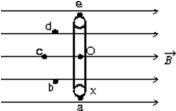
A)a
B)b
C)c
D)d
E)e

A)a
B)b
C)c
D)d
E)e

Unlock Deck
Unlock for access to all 90 flashcards in this deck.
Unlock Deck
k this deck
34
A square loop of wire lies in the plane of the page.A decreasing magnetic field is directed into the page.The induced current in the loop is:
A)counterclockwise
B)clockwise
C)zero
D)up the left edge and from right to left along the top edge
E)through the middle of the page
A)counterclockwise
B)clockwise
C)zero
D)up the left edge and from right to left along the top edge
E)through the middle of the page

Unlock Deck
Unlock for access to all 90 flashcards in this deck.
Unlock Deck
k this deck
35
A circular loop of wire is positioned half in and half out of a square region of constant uniform magnetic field directed into the page, as shown.To induce a clockwise current in this loop: 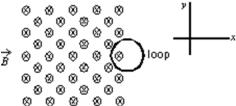
A)move it in +x direction
B)move it in +y direction
C)move it in -x direction
D)move it in -y direction
E)increase the strength of the magnetic field

A)move it in +x direction
B)move it in +y direction
C)move it in -x direction
D)move it in -y direction
E)increase the strength of the magnetic field

Unlock Deck
Unlock for access to all 90 flashcards in this deck.
Unlock Deck
k this deck
36
A 10 turn conducting loop with a radius of 3.0 cm spins at 60 revolutions per second in a magnetic field of 0.50 T.The maximum emf generated is:
A)0.014 V
B)0.085 V
C)0.53 V
D)0.85 V
E)5.3 V
A)0.014 V
B)0.085 V
C)0.53 V
D)0.85 V
E)5.3 V

Unlock Deck
Unlock for access to all 90 flashcards in this deck.
Unlock Deck
k this deck
37
A square loop of wire moves with a constant speed v from a field-free region into a region of uniform B field, as shown.Which of the five graphs correctly shows the induced current i in the loop as a function of time t? 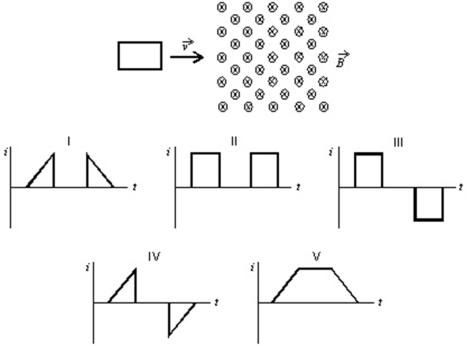
A)I
B)II
C)III
D)IV
E)V

A)I
B)II
C)III
D)IV
E)V

Unlock Deck
Unlock for access to all 90 flashcards in this deck.
Unlock Deck
k this deck
38
A circular loop of wire rotates about a diameter in a magnetic field that is perpendicular to the axis of rotation.Looking in the direction of the field at the loop the induced current is:
A)always clockwise
B)always counterclockwise
C)clockwise in the lower half of the loop and counterclockwise in the upper half
D)clockwise in the upper half of the loop and counterclockwise in the lower half
E)sometimes clockwise and sometimes counterclockwise
A)always clockwise
B)always counterclockwise
C)clockwise in the lower half of the loop and counterclockwise in the upper half
D)clockwise in the upper half of the loop and counterclockwise in the lower half
E)sometimes clockwise and sometimes counterclockwise

Unlock Deck
Unlock for access to all 90 flashcards in this deck.
Unlock Deck
k this deck
39
A magnet moves inside a coil.Consider the following factors:  Which can affect the emf induced in the coil?
Which can affect the emf induced in the coil?
A)I only
B)II only
C)III only
D)I and II only
E)I, II, III
 Which can affect the emf induced in the coil?
Which can affect the emf induced in the coil?A)I only
B)II only
C)III only
D)I and II only
E)I, II, III

Unlock Deck
Unlock for access to all 90 flashcards in this deck.
Unlock Deck
k this deck
40
A merry-go-round has an area of 300 m2 and spins at 2 rpm about a vertical axis at a place where the Earth's magnetic field is vertical and has a magnitude of 5 * 10-5 T.The emf around the rim is:
A)0 V
B)0.5 mV
C)3.1 mV
D)15 mV
E)190 mV
A)0 V
B)0.5 mV
C)3.1 mV
D)15 mV
E)190 mV

Unlock Deck
Unlock for access to all 90 flashcards in this deck.
Unlock Deck
k this deck
41
As an externally generated magnetic field through a certain conducting loop increases in magnitude, the field produced at points inside the loop by the current induced in the loop must be:
A)increasing in magnitude
B)decreasing in magnitude
C)in the same direction as the applied field
D)directed opposite to the applied field
E)perpendicular to the applied field
A)increasing in magnitude
B)decreasing in magnitude
C)in the same direction as the applied field
D)directed opposite to the applied field
E)perpendicular to the applied field

Unlock Deck
Unlock for access to all 90 flashcards in this deck.
Unlock Deck
k this deck
42
A cylindrical region of radius R contains a uniform magnetic field parallel to its axis.The field is zero outside the cylinder.If the magnitude of the field is changing at the rate dB/dt, the electric field induced at a point 2R from the cylinder axis is:
A)0
B)2R dB/dt
C)R dB/dt
D)(R/2)dB/dt
E)(R/4)dB/dt
A)0
B)2R dB/dt
C)R dB/dt
D)(R/2)dB/dt
E)(R/4)dB/dt

Unlock Deck
Unlock for access to all 90 flashcards in this deck.
Unlock Deck
k this deck
43
As a loop of wire with a resistance of 10 moves in a constant non-uniform magnetic field, it loses kinetic energy at a uniform rate of 5.0 mJ/s.The induced current in the loop is:
A)0 A
B)2.0 mA
C)2.8 mA
D)22 mA
E)cannot be calculated from the given data
A)0 A
B)2.0 mA
C)2.8 mA
D)22 mA
E)cannot be calculated from the given data

Unlock Deck
Unlock for access to all 90 flashcards in this deck.
Unlock Deck
k this deck
44
At a particular instant of time the total magnetic flux through a stationary conducting loop is less in magnitude than the flux associated with an externally applied field.This might occur because:
A)the applied field is normal to the loop and increasing in magnitude
B)the applied field is normal to the loop and decreasing in magnitude
C)the applied field is parallel to the plane of the loop and increasing in magnitude
D)the applied field is parallel to the plane of the loop and decreasing in magnitude
E)the applied field is tangent to the loop
A)the applied field is normal to the loop and increasing in magnitude
B)the applied field is normal to the loop and decreasing in magnitude
C)the applied field is parallel to the plane of the loop and increasing in magnitude
D)the applied field is parallel to the plane of the loop and decreasing in magnitude
E)the applied field is tangent to the loop

Unlock Deck
Unlock for access to all 90 flashcards in this deck.
Unlock Deck
k this deck
45
A cylindrical region of radius R = 3.0 cm contains a uniform magnetic field parallel to its axis.If the electric field induced at a point R/2 from the cylinder axis is 4.5 *10-3 V/m the magnitude of the magnetic field must be changing at the rate of:
A)0 T/s
B)0.30 T/s
C)0.60 T/s
D)1.2 T/s
E)2.4 T/s
A)0 T/s
B)0.30 T/s
C)0.60 T/s
D)1.2 T/s
E)2.4 T/s

Unlock Deck
Unlock for access to all 90 flashcards in this deck.
Unlock Deck
k this deck
46
The circuit shown is in a uniform magnetic field that is into the page.The current in the circuit is 0.20 A.At what rate is the magnitude of the magnetic field changing? Is it increasing or decreasing? 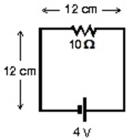
A)0 T/s
B)140 T/s, decreasing
C)140 T/s, increasing
D)420 T/s, decreasing
E)420 T/s, increasing

A)0 T/s
B)140 T/s, decreasing
C)140 T/s, increasing
D)420 T/s, decreasing
E)420 T/s, increasing

Unlock Deck
Unlock for access to all 90 flashcards in this deck.
Unlock Deck
k this deck
47
A 10-turn ideal solenoid has an inductance of 3.5 mH.When the solenoid carries a current of 2.0 A the magnetic flux through each turn is:
A)0 Wb
B)3.5 * 10-4 Wb
C)7.0 * 10-4 Wb
D)7.0 *10-3 Wb
E)7.0 *10-2 Wb
A)0 Wb
B)3.5 * 10-4 Wb
C)7.0 * 10-4 Wb
D)7.0 *10-3 Wb
E)7.0 *10-2 Wb

Unlock Deck
Unlock for access to all 90 flashcards in this deck.
Unlock Deck
k this deck
48
A copper penny slides on a horizontal frictionless table.There is a square region of constant uniform magnetic field perpendicular to the table, as shown.Which graph correctly shows the speed v of the penny as a function of time t? 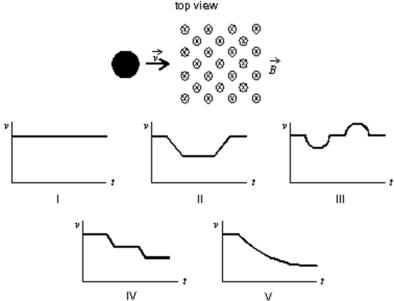
A)I
B)II
C)III
D)IV
E)V

A)I
B)II
C)III
D)IV
E)V

Unlock Deck
Unlock for access to all 90 flashcards in this deck.
Unlock Deck
k this deck
49
An electric field is associated with every:
A)magnetic field
B)time-dependent magnetic field
C)position-dependent magnetic field
D)object moving in a magnetic field
E)conductor moving in a magnetic field
A)magnetic field
B)time-dependent magnetic field
C)position-dependent magnetic field
D)object moving in a magnetic field
E)conductor moving in a magnetic field

Unlock Deck
Unlock for access to all 90 flashcards in this deck.
Unlock Deck
k this deck
50
A long narrow solenoid has length ℓ and a total of N turns, each of which has cross-sectional area A.Its inductance is:
A)µ0N2Aℓ
B)µ0N2A/ℓ
C)µ0NA/ℓ
D)µ0N2 ℓ/A
E)none of these
A)µ0N2Aℓ
B)µ0N2A/ℓ
C)µ0NA/ℓ
D)µ0N2 ℓ/A
E)none of these

Unlock Deck
Unlock for access to all 90 flashcards in this deck.
Unlock Deck
k this deck
51
A cylindrical region of radius R contains a uniform magnetic field, parallel to its axis, with magnitude that is changing linearly with time.If r is the radial distance from the cylinder axis, the magnitude of the induced electric field inside the cylindrical region is proportional to:
A)R
B)r
C)r2
D)1/r
E)1/r2
A)R
B)r
C)r2
D)1/r
E)1/r2

Unlock Deck
Unlock for access to all 90 flashcards in this deck.
Unlock Deck
k this deck
52
The unit "henry" is equivalent to:
A)volt.second/ampere
B)volt/second
C)ohm
D)ampere.volt/second
E)ampere.second/volt
A)volt.second/ampere
B)volt/second
C)ohm
D)ampere.volt/second
E)ampere.second/volt

Unlock Deck
Unlock for access to all 90 flashcards in this deck.
Unlock Deck
k this deck
53
A 3.5 mH inductor and a 4.5 mH inductor are connected in series.The equivalent inductance is:
A)0.13 mH
B)0.51 mH
C)1.0 mH
D)2.0 mH
E)8.0 mH
A)0.13 mH
B)0.51 mH
C)1.0 mH
D)2.0 mH
E)8.0 mH

Unlock Deck
Unlock for access to all 90 flashcards in this deck.
Unlock Deck
k this deck
54
As a loop of wire with a resistance of 10 moves in a non-uniform magnetic field, it loses kinetic energy at a uniform rate of 5 mJ/s.The induced emf in the loop is:
A)0 V
B)0.22 V
C)0.28 V
D)2.0 V
E)cannot be calculated from the given data
A)0 V
B)0.22 V
C)0.28 V
D)2.0 V
E)cannot be calculated from the given data

Unlock Deck
Unlock for access to all 90 flashcards in this deck.
Unlock Deck
k this deck
55
A cylindrical region of radius R contains a uniform magnetic field, parallel to its axis, with magnitude that is changing linearly with time.If r is the radial distance from the cylinder axis, the magnitude of the induced electric field outside the cylinder is proportional to:
A)R
B)r
C)r2
D)1/r
E)1/r2
A)R
B)r
C)r2
D)1/r
E)1/r2

Unlock Deck
Unlock for access to all 90 flashcards in this deck.
Unlock Deck
k this deck
56
A rod with resistance R lies across frictionless conducting rails in a constant uniform magnetic field B, as shown.Assume the rails have negligible resistance.The magnitude of the force that must be applied by a person to pull the rod to the right at constant speed v is: 
A)0
B)BLv
C)BLv/R
D)B2L2v/R
E)B2Lxv/R

A)0
B)BLv
C)BLv/R
D)B2L2v/R
E)B2Lxv/R

Unlock Deck
Unlock for access to all 90 flashcards in this deck.
Unlock Deck
k this deck
57
A 10-turn ideal solenoid has an inductance of 4.0 mH.To generate an emf of 2.0 V the current should change at a rate of:
A)0 A/s
B)0.5 A/s
C)50 A/s
D)250 A/s
E)500 A/s
A)0 A/s
B)0.5 A/s
C)50 A/s
D)250 A/s
E)500 A/s

Unlock Deck
Unlock for access to all 90 flashcards in this deck.
Unlock Deck
k this deck
58
A flat coil of wire, having 5 turns, has an inductance L.The inductance of a similar coil having 20 turns is:
A)4L
B)L/4
C)16L
D)L/16
E)L
A)4L
B)L/4
C)16L
D)L/16
E)L

Unlock Deck
Unlock for access to all 90 flashcards in this deck.
Unlock Deck
k this deck
59
A rod of length L and electrical resistance R moves through a constant uniform magnetic field  ; both the magnetic field and the direction of motion are parallel to the rod.The force that must be applied by a person to keep the rod moving with constant velocity
; both the magnetic field and the direction of motion are parallel to the rod.The force that must be applied by a person to keep the rod moving with constant velocity  is:
is:
A)0
B)BLv
C)BLv/R
D)B2L2v/R
E)B2L2v2/R
 ; both the magnetic field and the direction of motion are parallel to the rod.The force that must be applied by a person to keep the rod moving with constant velocity
; both the magnetic field and the direction of motion are parallel to the rod.The force that must be applied by a person to keep the rod moving with constant velocity  is:
is:A)0
B)BLv
C)BLv/R
D)B2L2v/R
E)B2L2v2/R

Unlock Deck
Unlock for access to all 90 flashcards in this deck.
Unlock Deck
k this deck
60
Which statement about eddy currents is false?
A)They can be prevented by cutting a slot in a solid conducting plate, to prevent electrons from being able to make a complete circuit.
B)The mechanical energy that is lost when eddy currents are created returns when the eddy currents cease.
C)They can be used as a passive braking system, as no external power source is needed if permanent magnets are used.
D)They are created in solid conducting plates as they move in and out of magnetic fields.
E)The faster the conductor moves, the larger the eddy currents will be.
A)They can be prevented by cutting a slot in a solid conducting plate, to prevent electrons from being able to make a complete circuit.
B)The mechanical energy that is lost when eddy currents are created returns when the eddy currents cease.
C)They can be used as a passive braking system, as no external power source is needed if permanent magnets are used.
D)They are created in solid conducting plates as they move in and out of magnetic fields.
E)The faster the conductor moves, the larger the eddy currents will be.

Unlock Deck
Unlock for access to all 90 flashcards in this deck.
Unlock Deck
k this deck
61
Immediately after switch S in the circuit shown is closed, the current through the battery is: 
A)0
B)V0/R1
C)V0/R2
D)V0/(R1 + R2)
E)V0(R1 + R2)/(R1R2)

A)0
B)V0/R1
C)V0/R2
D)V0/(R1 + R2)
E)V0(R1 + R2)/(R1R2)

Unlock Deck
Unlock for access to all 90 flashcards in this deck.
Unlock Deck
k this deck
62
The diagram shows an inductor that is part of a circuit.The direction of the emf induced in the inductor is indicated.Which of the following is possible? 
A)The current is constant and rightward
B)The current is constant and leftward
C)The current is increasing and rightward
D)The current is increasing and leftward
E)None of the above

A)The current is constant and rightward
B)The current is constant and leftward
C)The current is increasing and rightward
D)The current is increasing and leftward
E)None of the above

Unlock Deck
Unlock for access to all 90 flashcards in this deck.
Unlock Deck
k this deck
63
An inductance L, resistance R, and ideal battery of emf  are wired in series and the circuit is allowed to come to equilibrium.A switch in the circuit is opened at time t = 0, at which time the current is
are wired in series and the circuit is allowed to come to equilibrium.A switch in the circuit is opened at time t = 0, at which time the current is  /R.At any later time t the potential difference across the resistor is given by:
/R.At any later time t the potential difference across the resistor is given by:
A) (1 - e-Lt/R)
(1 - e-Lt/R)
B) e-Lt/R
e-Lt/R
C) (1 + e-Rt/L)
(1 + e-Rt/L)
D) e-Rt/L
e-Rt/L
E) (1 - e-Rt/L)
(1 - e-Rt/L)
 are wired in series and the circuit is allowed to come to equilibrium.A switch in the circuit is opened at time t = 0, at which time the current is
are wired in series and the circuit is allowed to come to equilibrium.A switch in the circuit is opened at time t = 0, at which time the current is  /R.At any later time t the potential difference across the resistor is given by:
/R.At any later time t the potential difference across the resistor is given by:A)
 (1 - e-Lt/R)
(1 - e-Lt/R)B)
 e-Lt/R
e-Lt/RC)
 (1 + e-Rt/L)
(1 + e-Rt/L)D)
 e-Rt/L
e-Rt/LE)
 (1 - e-Rt/L)
(1 - e-Rt/L)
Unlock Deck
Unlock for access to all 90 flashcards in this deck.
Unlock Deck
k this deck
64
An inductor with inductance L and a resistor with resistance R are wired in series to an ideal battery with emf  .A switch in the circuit is closed at time t = 0, at which time the current is zero.A long time after the switch is thrown the potential differences across the inductor and resistor are:
.A switch in the circuit is closed at time t = 0, at which time the current is zero.A long time after the switch is thrown the potential differences across the inductor and resistor are:
A)0,
B) , 0
, 0
C) /2,
/2,
 /2
/2
D)(L/R) , (R/L)
, (R/L)

E)unknown since the rate of change of the current is not given
 .A switch in the circuit is closed at time t = 0, at which time the current is zero.A long time after the switch is thrown the potential differences across the inductor and resistor are:
.A switch in the circuit is closed at time t = 0, at which time the current is zero.A long time after the switch is thrown the potential differences across the inductor and resistor are:A)0,

B)
 , 0
, 0C)
 /2,
/2, /2
/2D)(L/R)
 , (R/L)
, (R/L)
E)unknown since the rate of change of the current is not given

Unlock Deck
Unlock for access to all 90 flashcards in this deck.
Unlock Deck
k this deck
65
When the switch S in the circuit shown is closed, the time constant for the growth of current in R2 is: 
A)L/R1
B)L/R2
C)L/(R1 + R2)
D)L(R1 + R2)/(R1R2)
E)(L/R1 + L/R2)/2

A)L/R1
B)L/R2
C)L/(R1 + R2)
D)L(R1 + R2)/(R1R2)
E)(L/R1 + L/R2)/2

Unlock Deck
Unlock for access to all 90 flashcards in this deck.
Unlock Deck
k this deck
66
A 3.5 mH inductor and a 4.5 mH inductor are connected in parallel.When the total emf of the combination is 16 V, the rate of change of the current in the larger inductor is:
A)2.0 * 103 A/s
B)3.6 * 103 A/s
C)4.6*103 A/s
D)7.0 * 103 A/s
E)8.1 *103 A/s
A)2.0 * 103 A/s
B)3.6 * 103 A/s
C)4.6*103 A/s
D)7.0 * 103 A/s
E)8.1 *103 A/s

Unlock Deck
Unlock for access to all 90 flashcards in this deck.
Unlock Deck
k this deck
67
An inductance L and a resistance R are connected in series to an ideal battery.A switch in the circuit is closed at time t = 0, at which time the current is zero.The rate of increase of the energy stored in the inductor is a maximum:
A)just after the switch is closed
B)at the time t = L/R after the switch is closed
C)at the time t = 2L/R after the switch is closed
D)at the time t = (L/R)ln 2 after the switch is closed
E)a long time after the switch is closed
A)just after the switch is closed
B)at the time t = L/R after the switch is closed
C)at the time t = 2L/R after the switch is closed
D)at the time t = (L/R)ln 2 after the switch is closed
E)a long time after the switch is closed

Unlock Deck
Unlock for access to all 90 flashcards in this deck.
Unlock Deck
k this deck
68
An inductance L, resistance R, and ideal battery of emf  are wired in series and the circuit is allowed to come to equilibrium.A switch in the circuit is opened at time t = 0, at which time the current is
are wired in series and the circuit is allowed to come to equilibrium.A switch in the circuit is opened at time t = 0, at which time the current is  /R.At any later time t the current i is given by:
/R.At any later time t the current i is given by:
A)( /R)(1 - e-Lt/R)
/R)(1 - e-Lt/R)
B)( /R)e-Lt/R
/R)e-Lt/R
C)( /R)(1 + e-Rt/L)
/R)(1 + e-Rt/L)
D)( /R)e-Rt/L
/R)e-Rt/L
E)( /R)(1 - e-Rt/L)
/R)(1 - e-Rt/L)
 are wired in series and the circuit is allowed to come to equilibrium.A switch in the circuit is opened at time t = 0, at which time the current is
are wired in series and the circuit is allowed to come to equilibrium.A switch in the circuit is opened at time t = 0, at which time the current is  /R.At any later time t the current i is given by:
/R.At any later time t the current i is given by:A)(
 /R)(1 - e-Lt/R)
/R)(1 - e-Lt/R)B)(
 /R)e-Lt/R
/R)e-Lt/RC)(
 /R)(1 + e-Rt/L)
/R)(1 + e-Rt/L)D)(
 /R)e-Rt/L
/R)e-Rt/LE)(
 /R)(1 - e-Rt/L)
/R)(1 - e-Rt/L)
Unlock Deck
Unlock for access to all 90 flashcards in this deck.
Unlock Deck
k this deck
69
If both the resistance and the inductance in an LR series circuit are doubled the new inductive time constant will be:
A)twice the old
B)four times the old
C)half the old
D)one-fourth the old
E)unchanged
A)twice the old
B)four times the old
C)half the old
D)one-fourth the old
E)unchanged

Unlock Deck
Unlock for access to all 90 flashcards in this deck.
Unlock Deck
k this deck
70
A 3.5 mH inductor and a 4.5 mH inductor are connected in series and a time varying current is established in them.When the total emf of the combination is 16 V, the emf of the larger inductor is:
A)2.3 V
B)7.0 V
C)9.0 V
D)28 V
E)36 V
A)2.3 V
B)7.0 V
C)9.0 V
D)28 V
E)36 V

Unlock Deck
Unlock for access to all 90 flashcards in this deck.
Unlock Deck
k this deck
71
An inductance L, resistance R, and ideal battery of emf  are wired in series.A switch in the circuit is closed at time t = 0, at which time the current is zero.At any later time t the emf of the inductor is given by:
are wired in series.A switch in the circuit is closed at time t = 0, at which time the current is zero.At any later time t the emf of the inductor is given by:
A) (1 - e-Lt/R)
(1 - e-Lt/R)
B) e-Lt/R
e-Lt/R
C) (1 + e-Rt/L)
(1 + e-Rt/L)
D) e-Rt/L
e-Rt/L
E) (1 - e-Rt/L)
(1 - e-Rt/L)
 are wired in series.A switch in the circuit is closed at time t = 0, at which time the current is zero.At any later time t the emf of the inductor is given by:
are wired in series.A switch in the circuit is closed at time t = 0, at which time the current is zero.At any later time t the emf of the inductor is given by:A)
 (1 - e-Lt/R)
(1 - e-Lt/R)B)
 e-Lt/R
e-Lt/RC)
 (1 + e-Rt/L)
(1 + e-Rt/L)D)
 e-Rt/L
e-Rt/LE)
 (1 - e-Rt/L)
(1 - e-Rt/L)
Unlock Deck
Unlock for access to all 90 flashcards in this deck.
Unlock Deck
k this deck
72
An 8.0-mH inductor and a 2.0- resistor are wired in series to an ideal battery.A switch in the circuit is closed at time t = 0, at which time the current is zero.The current reaches half its final value at a time of:
A)2.8 ms
B)4.0 ms
C)3.0 s
D)170 s
E)250 s
A)2.8 ms
B)4.0 ms
C)3.0 s
D)170 s
E)250 s

Unlock Deck
Unlock for access to all 90 flashcards in this deck.
Unlock Deck
k this deck
73
A 3.5 mH inductor and a 4.5 mH inductor are connected in parallel.The equivalent inductance is:
A)0.13 mH
B)0.51 mH
C)1.0 mH
D)2.0 mH
E)8.0 mH
A)0.13 mH
B)0.51 mH
C)1.0 mH
D)2.0 mH
E)8.0 mH

Unlock Deck
Unlock for access to all 90 flashcards in this deck.
Unlock Deck
k this deck
74
An inductor with inductance L and an inductor with inductance 2L are connected in parallel.When the rate of change of the current in the larger inductor is 2000 A/s the rate of change of the current in the smaller is:
A)400 A/s
B)1000 A/s
C)1600 A/s
D)2000 A/s
E)4000 A/s
A)400 A/s
B)1000 A/s
C)1600 A/s
D)2000 A/s
E)4000 A/s

Unlock Deck
Unlock for access to all 90 flashcards in this deck.
Unlock Deck
k this deck
75
The diagrams show three circuits with identical batteries, identical inductors, and identical resistors.Rank them according to the current through the battery just after the switch is closed, from least to greatest. 
A)3, 2, 1
B)2 and 3 tie, then 1
C)1, 3, 2
D)1, 2, 3
E)2, 3, 1

A)3, 2, 1
B)2 and 3 tie, then 1
C)1, 3, 2
D)1, 2, 3
E)2, 3, 1

Unlock Deck
Unlock for access to all 90 flashcards in this deck.
Unlock Deck
k this deck
76
An 8.0-mH inductor and a 2.0- resistor are wired in series to a 20-V ideal battery.A switch in the circuit is closed at time t = 0, at which time the current is zero.After a long time the current in the resistor and the current in the inductor are:
A)0 A, 0 A
B)10 A, 10 A
C)2.5 A, 2.5 A
D)10 A, 2.5 A
E)10 A, 0 A
A)0 A, 0 A
B)10 A, 10 A
C)2.5 A, 2.5 A
D)10 A, 2.5 A
E)10 A, 0 A

Unlock Deck
Unlock for access to all 90 flashcards in this deck.
Unlock Deck
k this deck
77
A 6.0 mH inductor is in a circuit.At the instant the current is 5.0 A and its rate of change is 200 A/s, the rate with which the energy stored in the inductor is increasing is:
A)7.5*10-2 W
B)3.0 W
C)6.0 W
D)120 W
E)240 W
A)7.5*10-2 W
B)3.0 W
C)6.0 W
D)120 W
E)240 W

Unlock Deck
Unlock for access to all 90 flashcards in this deck.
Unlock Deck
k this deck
78
An inductance L, resistance R, and ideal battery of emf  are wired in series.A switch in the circuit is closed at time t = 0, at which time the current is zero.At any later time t the current i is given by:
are wired in series.A switch in the circuit is closed at time t = 0, at which time the current is zero.At any later time t the current i is given by:
A)( /R)(1 - e-Lt/R)
/R)(1 - e-Lt/R)
B)( /R)e-Lt/R
/R)e-Lt/R
C)( /R)(1 + e-Rt/L)
/R)(1 + e-Rt/L)
D)( /R)e-Rt/L
/R)e-Rt/L
E)( /R)(1 - e-Rt/L)
/R)(1 - e-Rt/L)
 are wired in series.A switch in the circuit is closed at time t = 0, at which time the current is zero.At any later time t the current i is given by:
are wired in series.A switch in the circuit is closed at time t = 0, at which time the current is zero.At any later time t the current i is given by:A)(
 /R)(1 - e-Lt/R)
/R)(1 - e-Lt/R)B)(
 /R)e-Lt/R
/R)e-Lt/RC)(
 /R)(1 + e-Rt/L)
/R)(1 + e-Rt/L)D)(
 /R)e-Rt/L
/R)e-Rt/LE)(
 /R)(1 - e-Rt/L)
/R)(1 - e-Rt/L)
Unlock Deck
Unlock for access to all 90 flashcards in this deck.
Unlock Deck
k this deck
79
An inductance L, resistance R, and ideal battery of emf  are wired in series.A switch in the circuit is closed at time t = 0, at which time the current is zero.At any later time t the potential difference across the resistor is given by:
are wired in series.A switch in the circuit is closed at time t = 0, at which time the current is zero.At any later time t the potential difference across the resistor is given by:
A) (1 - e-Lt/R)
(1 - e-Lt/R)
B) e-Lt/R
e-Lt/R
C) (1 + e-Rt/L)
(1 + e-Rt/L)
D) e-Rt/L
e-Rt/L
E) (1 - e-Rt/L)
(1 - e-Rt/L)
 are wired in series.A switch in the circuit is closed at time t = 0, at which time the current is zero.At any later time t the potential difference across the resistor is given by:
are wired in series.A switch in the circuit is closed at time t = 0, at which time the current is zero.At any later time t the potential difference across the resistor is given by:A)
 (1 - e-Lt/R)
(1 - e-Lt/R)B)
 e-Lt/R
e-Lt/RC)
 (1 + e-Rt/L)
(1 + e-Rt/L)D)
 e-Rt/L
e-Rt/LE)
 (1 - e-Rt/L)
(1 - e-Rt/L)
Unlock Deck
Unlock for access to all 90 flashcards in this deck.
Unlock Deck
k this deck
80
An 8.0-mH inductor and a 2.0- resistor are wired in series to a 20-V ideal battery.A switch in the circuit is closed at time t = 0, at which time the current is zero.Immediately after the switch is thrown the potential differences across the inductor and resistor are:
A)0 V, 20 V
B)20 V, 0 V
C)10 V, 10 V
D)16 V, 4 V
E)unknown since the rate of change of the current is not given
A)0 V, 20 V
B)20 V, 0 V
C)10 V, 10 V
D)16 V, 4 V
E)unknown since the rate of change of the current is not given

Unlock Deck
Unlock for access to all 90 flashcards in this deck.
Unlock Deck
k this deck


